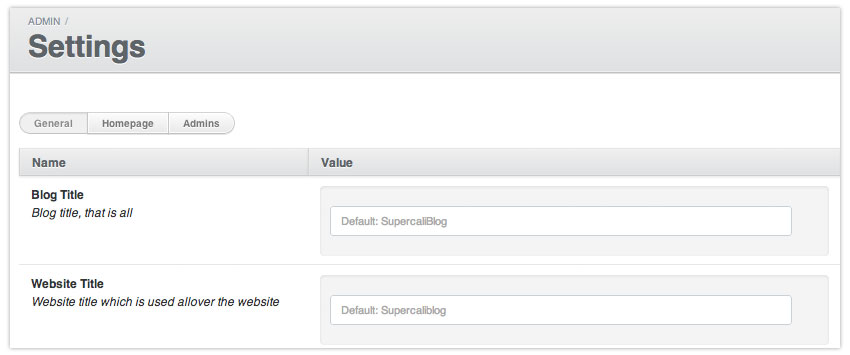IN DEVELOPMENT
TODO: use yaml file only for settings synchronisation, all settings should be stored in db with all those default values and other meta.
Easy to use general purpose settings backend for activeadmin.
Add to Gemfile:
gem "activeadmin-settings"
Run installer:
$ rails g activeadmin_settings:install
gem "aws-s3"
gem "fog"
gem "mini_magick"
gem "carrierwave"
gem "bson_ext"
gem "devise"
gem "activeadmin-settings"
Run migrations:
$ rake activeadmin_settings:install:migrations
$ rake db:migrate
If you're using mongoid 2.x the gem expects to see activeadmin-mongoid and carrierwave-mongoid (for image uploading feature) in Gemfile. Here is a working example:
gem "aws-s3"
gem "fog"
gem "mini_magick"
gem "carrierwave-mongoid"
gem "bson_ext"
gem "mongoid"
gem "mongoid-globalize"
gem "devise"
gem "activeadmin-mongoid"
gem "activeadmin-settings"
Here is an example of Gemfile with a support of 3.x version:
# Mongoid 3.x
gem 'moped', git: 'git://github.com/mongoid/moped.git'
gem 'mongoid', '~> 3.0.5'
# Assets
gem 'aws-s3'
gem 'fog'
gem 'mini_magick'
gem 'carrierwave-mongoid', git: 'git://github.com/jnicklas/carrierwave-mongoid.git',
branch: 'mongoid-3.0',
require: 'carrierwave/mongoid'
# Activeadmin
gem 'devise', '>= 2.1.2'
gem 'activeadmin-mongoid', git: 'git://github.com/elia/activeadmin-mongoid.git'
gem "mongoid-globalize"
gem 'activeadmin-settings'
After installation you should find a new Settings menu in the admin. If no configuration found in config/activeadmin_settings.yml only Admins tab is shown. Admin tab implements basic functionality of editing AdminUser objects.
To add some settings go to config/activeadmin_settings.yml. Settings are splitted into groups, each setting name concidered to be uniq, e.g.:
SEO:
Website Keywords:
description: These keywords are included in homepage header meta tag
default_value: lorem ipsum simply dummy text printing
Website Description:
type: text
description: Website description is used as value for header meta tag on homepage
default_value: Lorem Ipsum is simply dummy text of the printing and typesetting industry. Lorem Ipsum has been the industry's standard dummy text ever since the 1500s, when an unknown printer took a galley of type and scrambled it to make a type specimen book.
There are a few types of settings:
string(default) - a regular text inputlink- text input with a format:(TITLE) URLtext- textarea inputhtml- textarea with redactor.jsfile- input for file upload
Some examples:
Types Examples:
Logo Image:
type: file
description: Please make sure logo image size is 287x140 pixels
default_value: home/home-logo.jpg
CEO Message:
type: html
description: This text is used for the "CEO Message" page
default_value: >
<p><strong>Lorem Ipsum</strong> is simply dummy text of the printing and typesetting industry.</p>
<p>Lorem Ipsum has been the industry's standard dummy text ever since the 1500s, when an unknown printer took a galley of type and scrambled it to make a type specimen book.</p>
Facebook Link:
type: link
description: Company facebook page link
default_value: (Facebook) https://www.facebook.com/
Settings could be integrated into templates as well as models or controllers code using settings_value helper. For example:
<%= settings_value("CEO Message") %>- provides html<%= image_tag setting_value("Logo Image") %>- provides an image url:<img src="/production-assets-path/home/home-logo.jpg" /><%= settings_value("Facebook Link") %>- provides link:<a href="https://www.facebook.com/" title="Facebook">Facebook</a>
If setting value is null or an empty string default setting value is used which is defined in config/activeadmin_settings.yml.
I'm going to add types:
Boolean- checkbox or dropdown with two valuesDropdown- dropdown with optionsList- list bases selection
